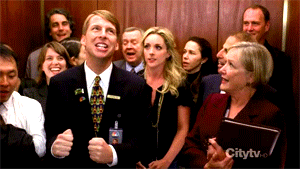Ah, the dreaded question. There I am, having a lovely conversation with a stranger, and they ask me what I do for a living, and I tell them, and then…. That Question.
Alexander Technique teachers spend hours trying to craft their individual “elevator speech” – that magical, one sentence habitual answer that will sum up what we do. In fact, I once went to an entire class on it at Sweetbriar, led by Michael Fredrick. A group of about 60 teachers and trainees went at trying to craft a single definition that suited everyone in the room. Abject failure. I wrote down a bunch of things that people said that resonated with me at the time. I read them over recently, and none of them do the trick for me today.
“The Kodály Method is a Hungarian system of music education that uses folk music to teach children music literacy.”
Boom. Clear. Understandable. If that’s all that people want to know, we’re done.
“Contra dance is a form of social dance from New England, where you and your partner travel together up and down a long line of partners. Eventually you dance with everyone else in the line as well as your partner. It’s a lot of fun, you should try it sometime!”
(More questions usually follow, but they’re easy to answer.)
“I teach piano lessons to people from 4 to 80 years old. I use an approach that reflects my years teaching Kodály and Music Learning Theory, and I adapt this using a wide variety of materials. I love teaching beginners – it’s never too late to start.”
(Leads usually to “What is Kodály and/or Music Learning Theory”, but that’s ok. See Kodály definition above.)
At this point, those answers practically pop out of my mouth when someone asks what I do. I don’t have to think much about them, and they make sense to people.
I believe that Alexander Technique is much more difficult to describe, because it is a technique, not a curriculum. It’s also a life-long learning, as opposed to a 3 summer certification course or a Master’s Degree. When I graduated with a Master’s in Kodály, I was young and still learning, but I was considered an “expert” in my field. When I graduated from Alexander Technique teacher training in midlife, I was a “beginning teacher.” It took about five years before I really felt that I knew what I was talking about and that my internal assessments of students are usually accurate.
Music education methodology, contra dance and piano lessons are specific things that people choose to learn. Alexander Technique is nebulous, since as a technique it can be applied to anything else you choose to learn about, including my other three areas above. This, I believe, is the heart of the problem. It’s much easier to define a specific curriculum than to define a technique which helps you to do virtually anything more easily.
I can hear other Alexander Technique teachers arguing with me now, saying “But there is a set of directions! Let your neck be free, let your head go forward and up, let the rest of your spine release in sequence, knees forward and away.” Well, yes.
I was trained, however, to apply the Technique in activity – which is more than just getting in and out of a chair, although I can (and do) teach that, too. So applying those directions, or, better, adaptingthose directions to someone’s choice of activity (which can vary from lesson to lesson) means that the directions I help them with change from lesson to lesson as well. Of course, always, neck free, head forward and up. But then…. choices present themselves.
I don’t want to get too esoteric here, because I’m primarily writing for people who are not Alexander Teachers. If you want to discuss this further, send me an email!
So, at this point, you’re probably wondering “Well, Robbin, what IS your definition of the Alexander Technique.” My answer is that it varies depending on who I am talking to. If I sense that someone is asking to be polite and that they are not at all interested, my answer is different than if someone seems genuinely curious. I can say that my definition always includes the words “ease and comfort in your daily activities” sometimes includes “restoring your natural poise and grace”, and almost never includes “posture.”
I hope that if you’ve been reading all of these blog posts – we’re up to #17 today! – you’ll have a sense of what I think the Alexander Technique is all about, at least as it relates to the Power of Habit in our lives. Which, fundamentally, is also what it’s all about – a technique to assist us in letting go of habits that no longer serve us. It’s an un-doing, rather than a doing more.
Even as a teacher, I’m still figuring out what the Alexander Technique is all about. My ideas keep expanding, kind of like the universe. I don’t expect that to stop, so my definition will never be habitual. It will continue to evolve and grow through the next decades of my life. I hope that’s a satisfactory answer, at least for today.
Do you have a habitual “elevator speech” to explain what you do for a living?
Is what you do for a living easy to define?
If not, what approach do you take to try to explain it?

 RSS Feed
RSS Feed